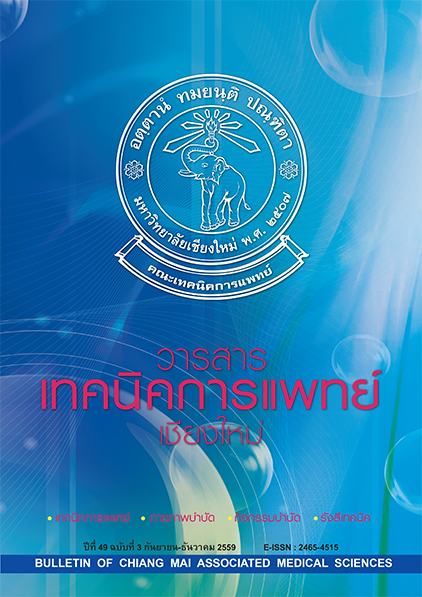Effects of cognitive training program on cognitive abilities in stroke patients
Main Article Content
Abstract
Background: Impairment of cognitive functions has an impact on an ability to pursue daily life occupations in stroke patients. As a consequence, cognitive training program for enhancing cognitive functions in this patient group is needed.
Objectives: To examine the effect of cognitive training program on 4 skills of cognitive functions including orientation, attention, memory, and executive functions, in stroke patients
Materials and methods: Participants were 10 cognitive impaired stroke patients as screened by the Mini-Mental State Examination: Thai Version (MMSE-Thai-2002). They were purposively recruited and received the cognitive training program 3 times a week for 6 consecutive weeks. The outcome measures for assessing cognitive abilities were the Trail Making Test, Thai Cognitive-Perceptual Test (Thai-CPT), and Dynamic Lowenstein Occupational Therapy Cognitive Assessment for Adults (DLOTCA). Data was analyzed using descriptive statistics and Wilcoxon Signed Ranks Test.
Results: After receiving the cognitive training program, participants had significant improvement in 4 cognitive skills; orientation, attention, memory, and executive functions (α=0.05).
Conclusion: Cognitive training program of this study could enhance cognitive abilities in stroke patients.
Bull Chiang Mai Assoc Med Sci 2016; 49(2): 298-306. Doi: 10.14456/jams.2016.39
Article Details
Personal views expressed by the contributors in their articles are not necessarily those of the Journal of Associated Medical Sciences, Faculty of Associated Medical Sciences, Chiang Mai University.
References
2. Ministry of Publice Health. Health statistics in 2003-2012 [Internet]. 2012 [cited 2014 Dec 1] Available from:http://bps.ops.moph. go.th/Healthinformation/ill-in42-48.htm
3. Patel M, Coshall C, Rudd AG, Wolfe CD. Natural history of cognitive impairment after stroke and factors associated with its recovery. Clinical Rehabilitation 2003; 17: 158-66.
4. Munkhetvit, P. Theoretical Base for Cognitive-Perceptual Intervention. In: Munkhetvit, P., editors. Occupational Therapy Intervention for Cognitive Impairment. Chiang Mai: Darawan Printing; 2008, p 1-22. (in Thai).
5. Koh CL, Haffmann T, Bennett S, Mckenna K. Management of patients with cognitive impairment after stroke: A survey of Australian occupational therapists. Australian Occupational Therapy Journal 2009; 56: 324-31.
6. Doornhein K, DeHaan EHF. Cognitive Training for Memory Deficits in Stroke Patients. Neuropsychological Rehabilitation1998; 8: 393-400.
7. Boman IL, Lindstedt M, Hemmingsson H, Bartfai A. Cognitive training in home environment. Brain Injury 2004; 18: 985-95.
8. Westerberg H, Jacobaeus H, Hirvikoski T, Clevberger P, Ostemsson ML, Bartfai A, et al. Computerized working memory training after stroke-A pilot study. Brain Injury 2007; 21: 21-9.
9. Pyun SB, Yang H, Lee S, Yook J, Kwon J, Byun EM. A home programme for patients with cognitive dysfunction: A pilot study. Brain Injury 2009; 23: 686-92.
10. Boman IL, Stenvall CL, Hemmingsson H, Bartfai A. A training apartment with a set of electronic memory aids for patients with cognitive problems. Scandinavian Journal of Occupational Therapy 2010; 17: 140-8.
11. Yip BCB, Man DWK. Virtual reality-based prospective memory training program for people with acquired brain injury. Neuro Rehabilitation 2013; 32: 103-15.
12. Munkhetvit P, Rattakorn P, Ditwichairut R, Khanthee R. Development of Cognitive Training Program for Stroke Patients: Study of Effects on Cognitive Abilities and Activities of Daily Living. Research report. Faculty of associated Medical Sciences, Chiang Mai University, 2016. (in Thai).
13. Flynn TM, Storandt M. Supplemental group discussions in memory training for older adults. Psychology & Aging 1990; 5: 178-81.
14. Stigsdotter A, Backman L. Multifactorial memory training with older adults. Gerontology1989; 35: 260-267.
15. Hayslip B, Maloy RM, Kohl R. Long-term efficacy of fluid ability interventions with older adults. The Journals of GERONTOLOGY 1995; 3: 141-9.
16. Lim MHX, Liu KPY, Cheung GSF, Kuo MCC, Li R, Tong CY. Effectiveness of a Multifaceted Cognitive Training Programme for People with Mild Cognitive Impairment: A One-Group Pre-and Posttest Design. Hong Kong Journal of Occupational Therapy 2012; 22: 3-8.
17. Griffin LJ, Hickey JV. Considerations and strategies for educating stroke patients with neurological deficits. Journal of Nursing Education and Practice 2013; 3: 125-37.
18. Kneebone I, Walker-Samuel N, Swanston J, Otto E. Relaxation training after stroke: potential to reduce anxiety. Disability and Rehabilitation An international, multidisciplinary journal 2014; 36: 771-4.
19. Yuen EY, Wei J, Liu W, Zhong P, Li X, Yan Z. Repeated Stress Causes Cognitive Impairment by Suppressing Glutamate Receptor Expression and Function in Prefrontal Cortex. Neuron 2012; 73: 962–977. Newberg AB, Wintering N, Khalsa DS, Roggenkamp H, Waldman MR. Meditation effects on cognitive function and cerebral blood flow in subjects with memory loss: a preliminary study. Journal of Alzheimer’s Disease 2010; 20: 517-26.
20. Carter LT, Howard BE, O’Neil WA. Effectiveness of Cognitive Skill Remediation in Acute Stroke Patients. The American Journal of Occupational Therapy 1983; 37: 320-6.
21. Cicerone KD. Methodological issues in evaluating the effectiveness of cognitive rehabilitation. In: Halligan PW, Wade DT, editors. Effectiveness of Rehabilitation for Cognitive Deficits. 1st ed. New York: Oxford University Press Inc; 2005, p 43-58.
22. Brum PS, Forlenza OV, Yassuda MS. Cognitive training in older adults with Mild Cognitive Impairment Impact on cognitive and functional performance. Dementia & Neuropsychologia 2009; 3: 124-31.
23. Cotter VT, Teixira J. Early Stage Dementia: Maximizing Self-Direction and Health. In: Boltz M, Galvin JE, editors. Dementia Care An Evidence-Based Approach. 1st ed. Switzerland: Springer International Publishing Inc; 2016 p 61-8.


